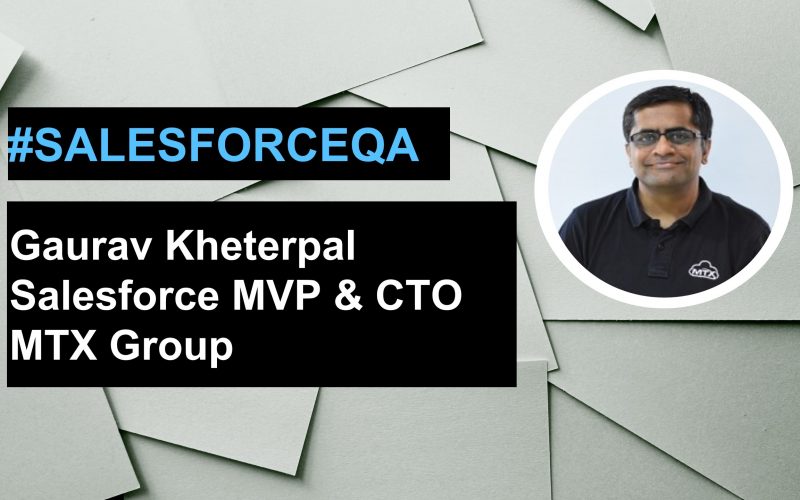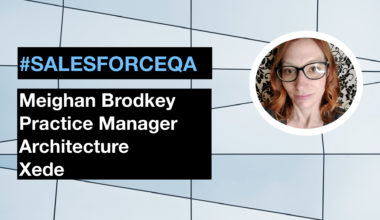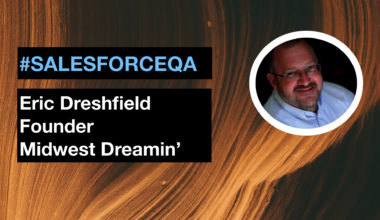In our most recent #SalesforceQA interview, we caught up with CTO at MTX Group Inc and Salesforce MVP, Gaurav Kheterpal. Gaurav talks about the pandemic has affected the organisation’s priorities and expectations of technology, and imparts the best piece of advice he has received throughout his career.
Gaurav also mentions the key things he thinks that have helped him to become a Salesforce MVP, as well as the importance of the Salesforce community to career advancement.
Salesforce Republic (SR): Could you talk us through your career in Salesforce, and why you decided to pursue a career in the ecosystem?
Gaurav Kheterpal (GK): I started my career in Salesforce more by accident than actual planning. It was in 2007, when I moved back to my hometown, the company I joined was exploring Salesforce for a couple of projects. I was engaged in a prototype and to be honest, I would not say that it was love at first sight. Before this I had been working on protocol stacks and doing a lot of system level programming, but over a period of time, I began to appreciate what Salesforce provides in terms of the core platform capabilities, as well as the various aspects of the Salesforce ecosystem. I think after the initial few projects, there was really no looking back, now it’s been 13 years and I can’t see myself going away any time soon.
SR: As the CTO at MTX Group Inc, could you talk a bit about how the pandemic has affected the organisation’s priorities and expectations of technology?
GK: I think it’s fair to say that nobody saw this coming. But I think the organisations that had a good business continuity plan, or that were able to pivot quickly, have been able to not just survive, but grow tremendously. At MTX, we are very fortunate that we pivoted early this year. We actually did a lot of work in emergency response management, not just around contact tracing, but also helping organisations safely reopen, helping the tourism sector, helping hospitals, and now a lot of our focus is actually on vaccination management. As and when the vaccine becomes available, we’ve actually built a system which will help cities, states, and countries, streamline the distribution of that vaccination.
I would say this pandemic has kind of been a blessing in disguise in the sense that it has helped us realise the critical role technology plays in our day to day lives. Whilst there is a lot to be done in this battle against coronavirus, overall I do predict a strong recovery happening in the Salesforce sector.
SR: How have you found managing a largely distributed team throughout the pandemic? Are there any notable tips that you feel helped maintain collaboration whilst working remotely?
GK: I think by and large, this challenge is automatically taken care of by the tools and technology that we use, such as Zoom and Meet. We at MTX use a lot of collaboration tools and have automated a lot of our processes, which has really helped us in this situation.
One thing that I think is very important during this time, is to realise that everybody is going through their own struggles. As a result of this, I think it’s vital to keep in touch with your team and keep spirits uplifted. There is definitely a human aspect to it which the technology cannot replace.
SR: You recently spoke on the Salesforce Developers Podcast about the use of Einstein AI for Commerce, could you talk a little bit more about this?
GK: The way Salesforce has positioned Einstein, they’ve done a really good job in terms of creating an Einstein layer for each of their core products; whether that’s the platform, Service Cloud or Sales Cloud. They also did this with the Commerce Cloud platform as well and now Einstein brings new capabilities to the platform that were not really present earlier. For example, predictive recommendations for products that a user could buy, predictive sorting, predictive emails on what could be a good campaign to engage the user. In that regard it’s been a step up from the earlier capabilities that the commerce cloud platform had, from a business perspective. From a customer perspective I think it has added a new dimension which was missing earlier; now sellers are able to understand insights a lot better, people are able to plan their shopping experiences better, and at the same time, sellers are able to provide experiences which are much more personalised and tailored to customers.
SR: You’re a 5x Salesforce MVP, what do you think are the key things that have helped you to achieve this?
GK: I actually wrote a piece about this on my blog. I think it’s the wrong question when people ask, ‘What should I do to become a Salesforce MVP?’ I think it’s less about the accolade and more about focusing on consistently contributing and giving back to the community. If you do that over a period of time, I think Salesforce will recognise that.
There are multiple ways to contribute to the Salesforce community, a lot of people have built their own niche in terms of how they contribute, some people write blogs, some create YouTube videos, others speak at events. For me, I think it’s an assorted collection of everything. I have a blog and I love speaking at events and sharing my knowledge around Salesforce mobile development, and especially around commerce cloud. With this pandemic making a lot of events virtual I’ve actually had the privilege of speaking to a number of groups across continents. There is no one size fits all approach, it’s up to you on how you think you can best help the community.
SR: As an active member of the Salesforce community, how important do you think the ecosystem is to career advancement?
GK: I think it’s very, very important. I have been running a developer user group for about eight years now, and people who originally came to the group just wanting to learn more about Salesforce, now have successful careers working for Salesforce and companies like Google and Amazon. That in itself is a testimony to what the community can do. But it’s not just about learning, it’s also about how people interact with each other and help others in the community. The Salesforce Ohana is unparalleled. I’ve been a part of other ecosystems, but this is unlike anything that I’ve seen before.
For people that are in the Salesforce ecosystem, my advice is to join your local user group, be active in the Trailblazer community and you may not realise it but eventually, it will help you in your career.
SR: You have multiple certifications; how did you find the journey to receiving these and is there anything you have learnt by going through the process?
GK: As I said, I’ve been in the ecosystem for around 13 years, which has obviously allowed me to work on multiple Salesforce cloud offerings, and gain hands on experience, which has helped me get these certifications.
I actually posted about this recently on LinkedIn. My fundamental approach to all certifications has been the same; use the resources that are available. Trailhead is a fantastic learning resource; do the corresponding Trailmix for the certification. If you work for a Salesforce partner, there are a lot of courses on the Partner Learning Camp (PLC). There are also a number of fast path courses that Salesforce partner teams run, which are aimed at certifications, those are great. Trailhead Academy does a lot of classes around certifications, which are absolutely fantastic. I have used all of these resources. But the most important thing is that there is no substitute for studying and practicing, the more you study and the more you practice, the more confident you feel in the exam, and the higher your chances of passing become.
SR: Finally, what’s the best piece of advice you have received throughout your career?
GK: This was something I was told in the early stages of my career. One of my previous managers mentioned it the day I got an award from them. Their advice was to never rest on past laurels, just keep learning, as this is the only way to grow. That’s an approach which I have followed for the last 20 odd years. I think people do tend to become complacent once they achieve something, but it’s important to keep going, to keep that motivation and find that next challenge.
To follow Gaurav’s Salesforce journey, check out the links below.
If you’re a Salesforce professional and would like to be involved in our Q&A series, please get in touch today!


